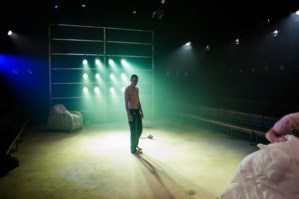Yen has its roots in reality – a news report about two neglected brothers convicted of a violent sex crime. But, in imagining the lives that led up to that act, Anna Jordan‘s play, a Bruntwood Prize winner seen in Manchester last year, becomes a piece of hardcore poverty porn with little bearing on reality. It’s galling, engrossing and deeply problematic.
Hench, 16, and his younger brother Bobby live more or less alone. Their dog Taliban is in the room next door, but their diabetic, alcoholic mother has moved in with her partner, Mingeface Alan as the boys call him. Left to fend for themselves, the brothers exist on a diet of hardcore pornography and violent video games, lazing around their tatty beige flat in tracksuit bottoms, their square eyes straining out of their skulls.
Jordan shows how these cultural influences filter into the boys’ behaviour and back and forth that’s violent, misogynistic and homophobic. Cut off from the outside world (Georgia Lowe‘s design makes them climb 10 foot just to see out of the window), with no adult influences, their behaviour warps beyond civility. Yet there’s tenderness between them too – there has to be. Hench keeps an eye on his brother’s rash. Bobby strips the bed when Hench wets it.
Yen is a troubling watch – not because of what it shows, but how. Jordan might have taken real events as inspiration, but she has undoubtedly ended with a piece of entertainment – and a deeply problematic one at that. The boys’ behaviour, their rough and tumble, their way with words, is never less than watchable, often bluntly funny, but it’s hard to shake the sense that they’ve been made into a spectacle, perhaps even sensationalised. (Jordan has said she set herself a challenge: "to explore the most taboo subject I could imagine.")
This is, in other words, a cartoon of neglect; a picture postcard of extreme poverty. The vividness of its world makes it all the more troublesome. Distilling the boys’ lives to a loop feels reductive and the play’s prognosis (porn + video games junk food – parental love = violent sex criminals) is simplistic beyond all measure, stopping well short of societal causes. It’s like Jordan’s swallowed the Daily Mail editorial line whole. Yen‘s as authentic as a chicken nugget.
Yet, strangely, it’s not unaware of that fact. Midway through, Jordan airdrops in Jen (Annes Elwy), a 16-year-old Valleys girl newly moved in over the road. Well-spoken and well-meaning, she lands like a one-woman humanitarian relief mission – a female presence, willing to show the boys some love. Like them, she lost her father, and Jordan implies a selfishness to her actions as well as saintliness. What does she stand to gain? Why does she think she can help? And how does she represent us, a presumably middle-class audience?
Jordan never fully untangles that knot, and her play risks hypocrisy in critiquing the boys’ viewing habits, while letting ours, as theatregoers, go unscrutinized. Ned Bennett nods to the issue, without entirely slamming it shut. Georgia Lowe’s set makes the flat a kind of monkey enclosure – a choice that, in practice, says more about the brothers than it does about spectators – while Elliot Griggs’ stadium-style lighting asks questions about entertainment, while making the whole thing look great.
Undoubtedly, as entertainment, it’s excellent. Bennett has a real knack with tone, stretching violence and silence to full potential, and he draws quite brilliant performances from a young (though not young enough) cast. Alex Austin, sallow and scrawny, finds a sympathetic self-awareness in Hench, as if some small sliver of hope still survives, while Jake Davies’s Bobby bounds around like a yappy young Rottweiler. The more watchable they make Yen, however, the harder it is to watch.
Yen runs at the Royal Court until 13 February.













